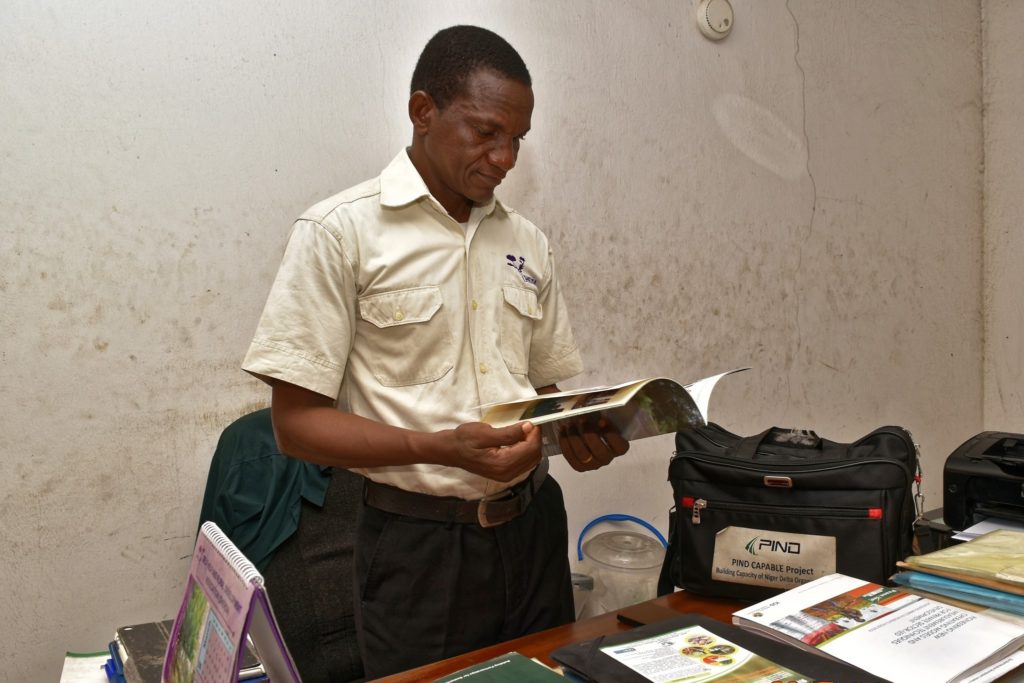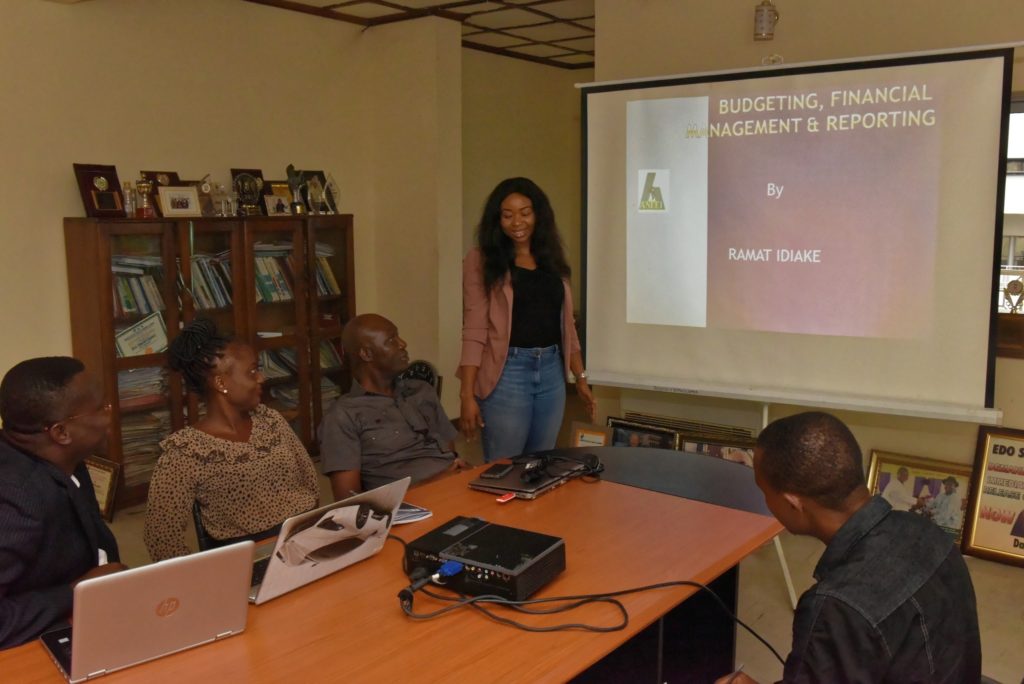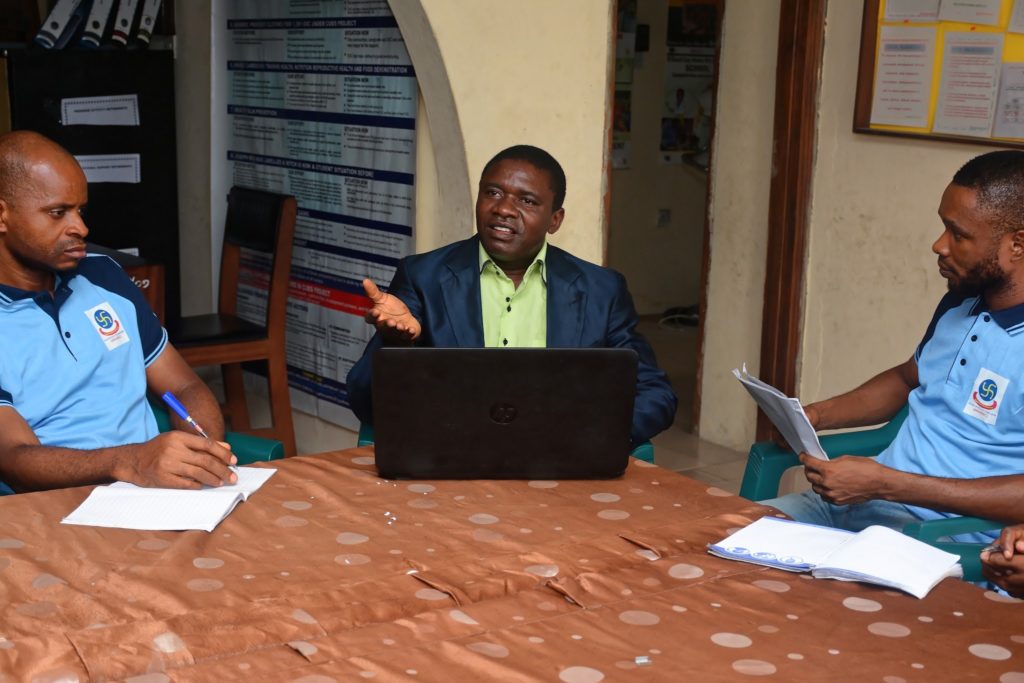Our Capacity Building program works to improve service delivery of civil society organizations and government officials. In 2016, our Capacity Building for Local Empowerment (CAPABLE) Project provided trainings on monitoring and evaluation, resource mobilization and fundraising, social media and advocacy to 268 participants from 47 local development organizations. Also under CAPABLE, 17 out of these organizations were trained in collaboration with the UK Department for International Development (DFID)-funded Market Development (MADE) program on the Making Markets Work for the Poor (M4P) as part of PIND’s work to encourage more organizations to embrace market-driven approaches to development in the region. PIND also built organizational capacity under the Strengthening Advocacy for Civic Empowerment (SACE) project, a PIND and United States Agency for International Development (USAID)-funded grant for civil society organizations working in the democratic governance space.
Organizations that partook in these trainings have increased both their service delivery and their ability to raise funding for their work. In the following stories, representatives of these participating organizations talk about their work and the impact of the trainings and capacity building opportunities on their organizations.
Dr. Samuel Dare, Self-Help and Rural Development Association (SHERDA) Warri, Delta State and Port Harcourt, Rivers State

Dr. Samuel Dare, Director at Self-Help and Rural Development Association (SHERDA), at his office in Warri, Delta State. His organization SHERDA began using PIND’s Making Markets Work for the Poor (M4P) approach to economic development following a CAPABLE M4P training
SHERDA was registered in December 2004, and we work to improve family welfare, reduce poverty, promote sustainable social and economic development of the communities and enhance income in rural communities. We work to achieve these goals without any adverse effect on the environment in which people live and on which they depend for their livelihoods. .
PIND brought a new approach to the implementation of our programs, especially on our community development projects. They introduced the Making Markets Work for the Poor (M4P) approach, which has helped various partners and beneficiaries to have ownership of their projects. This has brought about a mindset change in the region.
Because we have been working with PIND for a long time, we have had opportunities to share information on our gaps as an organization, and that is how we became part of CAPABLE. There is nothing that we have learned during CAPABLE that is not useful. We have at least six staff that have gone through the program, and their performance and delivery is better as a result. They have now all become resource persons in their different areas. We have even applied what we learned on best practices in improving capacity to our capacity building work for youth and how we develop our own staff. Two of our staff have taken part in the M4P training, and all these trainings have helped us to do capacity assessments better.
As a result of CAPABLE training, we have also been able to get funding through grants. Following these trainings, we have been a beneficiary of EU funding and currently have a UNDP program running, because we learned proposal writing under CAPABLE. We are still working on more proposals to be submitted to other donors.
This added capacity has also helped improve our name recognition and boost local partnerships. Since the training, Niger Delta Wetlands Corporation has partnered with us to work with farmers in Bayelsa State, and also an NGO mapping in which we used the Organizational Capacity Assessment that we learned from PIND. Through our PIND partnership we have been able to do much more as a result.

Ramat Idiake, Finance Officer at ANEEJ, makes a presentation on ANEEJ’s financial reporting at her office in Benin, Edo State. Her organization both benefited from a CAPABLE training and is a beneficiary of a Strengthening Advocacy for Civic Engagement (SACE) grant.
I work with ANEEJ, and our organization mostly deals with governance, environmental justice, a whole host of issues. We’re currently a SACE partner working with other advocacy cluster members. PIND is funding SACE in collaboration with USAID.
I work in the finance department at ANEEJ. We started to build a relationship with PIND during the Capacity Building trainings. These were trainings to increase our ability to get grants and proposals, prepare concept notes and newsletters, make presentations, and more. We participated in resource mobilization training and it helped us to figure out how to sustain our organization without solely relying on donor funding. Each organization sends two or three staff to CAPABLE, and I partook on behalf of my organization. It really opened my eyes. Now I understand what the programs staff do, and I am now involved in program strategy development. I am now not just a finance staff; I can perform other program functions.
PIND provided that foundational support with CAPABLE, but took us even further with SACE. The transparency workshop really made us think about what we do in our organization. We use a lot of SACE ideas elsewhere in our work, and including in our monitoring and evaluation.
When we did the CAPABLE training I realized that some of our internal documentation weren’t properly processed and approved. Our procurement process also was not very well documented. Because of the PIND training, we worked to make ourselves better. Now we’re more inclusive, as we do more gender mainstreaming and include Persons with Disabilities (PWDs) in our work. We now have the right systems in place.
With our advocacy with SACE, we worked with cluster members to achieve some important things this year: we got NGOs to sit with government to advocate for things, we got the Niger Delta Development Commission (NDDC) to start publishing their budget and reports online, and even did research for Delta State Oil-Producing Areas Development Commission (DESOPADEC) and a few others. Part of our recommendations to DESOPADEC was to set up website, and so they have done so. We facilitated an NDDC meeting and issued a communiqué on how they should be go back to finish incomplete projects, and we are pleased to see that this is now being done.
The network we have from SACE made the work richer. We work with Green Concern for Development (Greencode) and Gender and Development Action (GADA) et al, and we are all working to entrench capacity to hold govt accountable. When they have trainings they also step it down. We have got the communities involved. We are working towards better outcomes for all.
Ekanem Inyang, Applicant Welfare Organization Uyo, Akwa Ibom State

Ekanem Inyang, Executive Director at Applicant Welfare Organization, facilitates a capacity building training at his office in Uyo, Akwa Ibom State. As a result of the CAPABLE training, his organization has been able to attract more funding and boost its profile
We’ve known PIND for a long time, since 2011. Since then we’ve been working with them on different programs and activities, including CAPABLE and other programs like WASH, for example. We have a good relationship with PIND. We also work on youth issues, particularly on developing youth skills and steering them away from militancy.
We were involved in CAPABLE I and the Advanced CAPABLE training. During the training, we had courses on proposal writing, ICT, communications, finance, and other various things. The first batch was a three-week long training, and for that we sent two persons from our organization. We also sent two people for the second more advanced training. After each of the trainings, we did a step-down for the staff.
Since these trainings, there has been a lot of changes in our organization. We have improved on our documentation, developed some new policies. We have human resource policies, social media policy, and even an open information policy which defines what we can share externally. These were policies we did not have before, and they are useful to ensure that everyone within the organization is on the same page.
We have learned a lot. Our capacity has been well strengthened. The organization’s system has been strengthened. After we passed through CAPABLE, we wrote a proposal to an Akwa Ibom State agency and we won the contract to train their staff. They even gave us a certificate for a job well done. We were able to apply the knowledge in preparing a proposal for a USAID for a public health program targeting Orphan and Vulnerable Children (OVCs) in the state for five years, and I am glad to say that we won. Our financial documentation has also really helped us. We have realized that PIND monitoring us has helped keep us abreast of best practices and in tune with what we have learned. The other time when West African Development (WAD) came, they did an assessment of us, and the result of the assessment was in tune with what we had done internally, so everyone is confident that there is no bias and that our internal work meets best practice.
So as a result of CAPABLE, we are now capable of training others! These things help us grow and sustain our work.
SACE Organizations Made Giant Strides to Boost Public Engagement in the Niger Delta and Beyond
Strengthening Advocacy for Civic Engagement (SACE) project participating organizations take advantage of collective impacts of working together in clusters with other Niger Delta organizations interested in bringing about change in six areas of advocacy. The eight SACE partners organizations, referred to as Anchors, work with eight different clusters wherein they are provided coaching and mentoring by the project. The clusters began work in November 2014 following the SACE project launch. Each of the Anchors lead the advocacy clusters working to drive advocacy efforts in their given sectors. Niger Delta organizations in these clusters who completed our Annual Progress Index reported an average net change of 53% on the System for Transformation and Results (STAR) index, a tool used to measure the capacity of organizations.
SACE Niger Delta Organizations and the focus areas:
- Africa Network for Economic and Environmental Justice (ANEEJ), Effective Resource Management in Niger Delta Institutions
- Leadership Initiative for Transformation and Empowerment (LITE-Africa), Effective Resource Management in Niger Delta Institutions
- Citizens Centre for Integrated Development and Social Rights (CCIDESOR), Accountability in Health and Education in Imo State
- Edo State Cooperative Farmers Agency Limited (ESCFAL), Effective Agricultural
- Policy
- Ugboroke Progressive Fish Farmers Association (UPFFA), Effective Agricultural Policy
- Social Development Integrated Centre/Social Action (SDIC), Open Budget in Niger Delta
- Nembe City Development Foundation (NCDF), Peace Advocacy
- Youth Alive Foundation (YAF), Youth Advocacy
Some of their achievements in 2016:
- The Niger Delta Open Budget Cluster, anchored by SDIC, successfully advocated for the publication of state budget in Akwa Ibom and Delta States.
- Joint advocacy efforts by Effective Resource Management in Niger Delta Institutions clusters, ANEEJ and LITE-Africa led to the inclusion of CSOs in the Project Monitoring Committee of the Niger Delta Development Commission (NDDC)
- The Peace Cluster, anchored by NCDF, successfully facilitated the emergence of the Central Peace Working Committee in Bayelsa State. The committee brings the Nigerian Police Force, the Department for State Security, the Joint Task Force, and the Nigerian Civil Defence Corps together with CSOs to identify early signs of crisis and avert conflict in a number of communities.
- The Youth Advocacy Cluster, anchored by the YAF, and their 10%4Youth campaign provided impetus for the Akwa Ibom State Legislature to conduct the very first hearing for the proposed Youth Empowerment Bill
- Due to a strategic set of interventions and public awareness campaigns with communities undertaken by the Open Budget Cluster, anchored by CCIDESOR, long-abandoned capital projects have been revitalized with 49 completed to date and an additional 99 on going.
- Cross-cluster collaboration in the Niger Delta by ANEEJ, LITE-Africa and SDIC led to the inclusion of civil society in monitoring processes with the NDDC, which will culminate in the establishment of a cross-cluster independent monitoring platform for all Niger Delta States on project implementation.
- SACE launched the innovative 2.0 Mindset Series to share experiences from successful advocates who are already operating with a 2.0 (advocacy) mindset. The series attracted seasoned practitioners, including the Minister of Environment, Amina Mohammed, and the Speaker of the Akwa Ibom State House of Assembly. The series provided opportunities to share perspectives on effective advocacy with SACE partners and a wider audience. In the Annual Progress Index, SACE partners identified the 2.0 Mindset Series as a key set of events for shaping and refining their advocacy work.